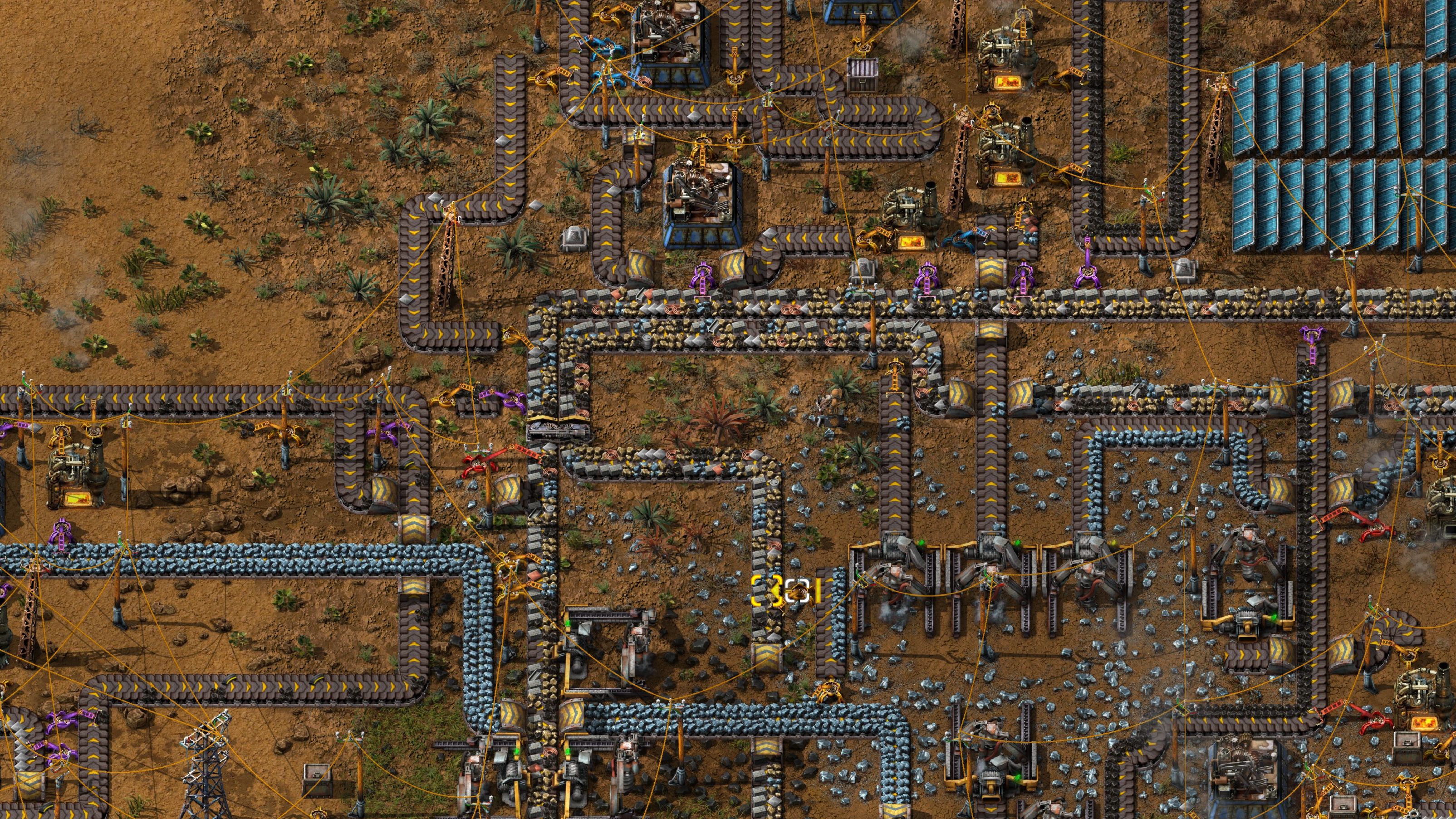Our Verdict
Buy Factorio. Build Factorio. Become Factorio.
PC Gamer's got your back
What is it? Complex and absorbing factory management game.
Expect to pay $30/£21
Developer Wube Software
Publisher Wube Software
Reviewed on Nvidia GeForce 2080 Super, AMD Ryzen 5 3600, 32 GB Ram
Multiplayer? Competitive and cooperative modes.
Link Official site
Let's skip the preamble, shall we? Factorio is brilliant. If you're remotely interested in games about management, construction, and above all production chains, then hop aboard the nearest conveyor belt and grab yourself a copy of Factorio this instant. Then pick up another copy for the most important person in your life, because they won't be seeing you for a while, and at least this way they'll understand why.
Factorio starts out as all great works of fiction do, with a huge explosion. That would be your spaceship crashing onto a remote alien planet, and the only way off that far-flung rock is to build yourself a whole new rocket. Oops. Luckily, you happen to be the handiest person in the entire universe, able to fashion almost anything with little more than spit and elbow grease. Whether it's a stone furnace, a steam engine, or an oil refinery, give your little protagonist the ingredients, and they'll slap it together like a two-piece jigsaw.
Yet while your character can craft most in-game objects themselves, the quantities they require makes this approach prohibitive. It's not just the rocket you need to build. Everything you need to design, manufacture, calibrate and fuel the rocket needs constructing as well. As a simple example (by Factorio's standards) you're going to need to produce electronics. This means you need the capability to mine and smelt metals, specifically iron and copper. In turn, this requires equipment for mining and smelting metals. You need to smelt copper ore into copper plate, turn copper plate into copper wire, and combine copper wire with iron plates to create basic electronic circuits.
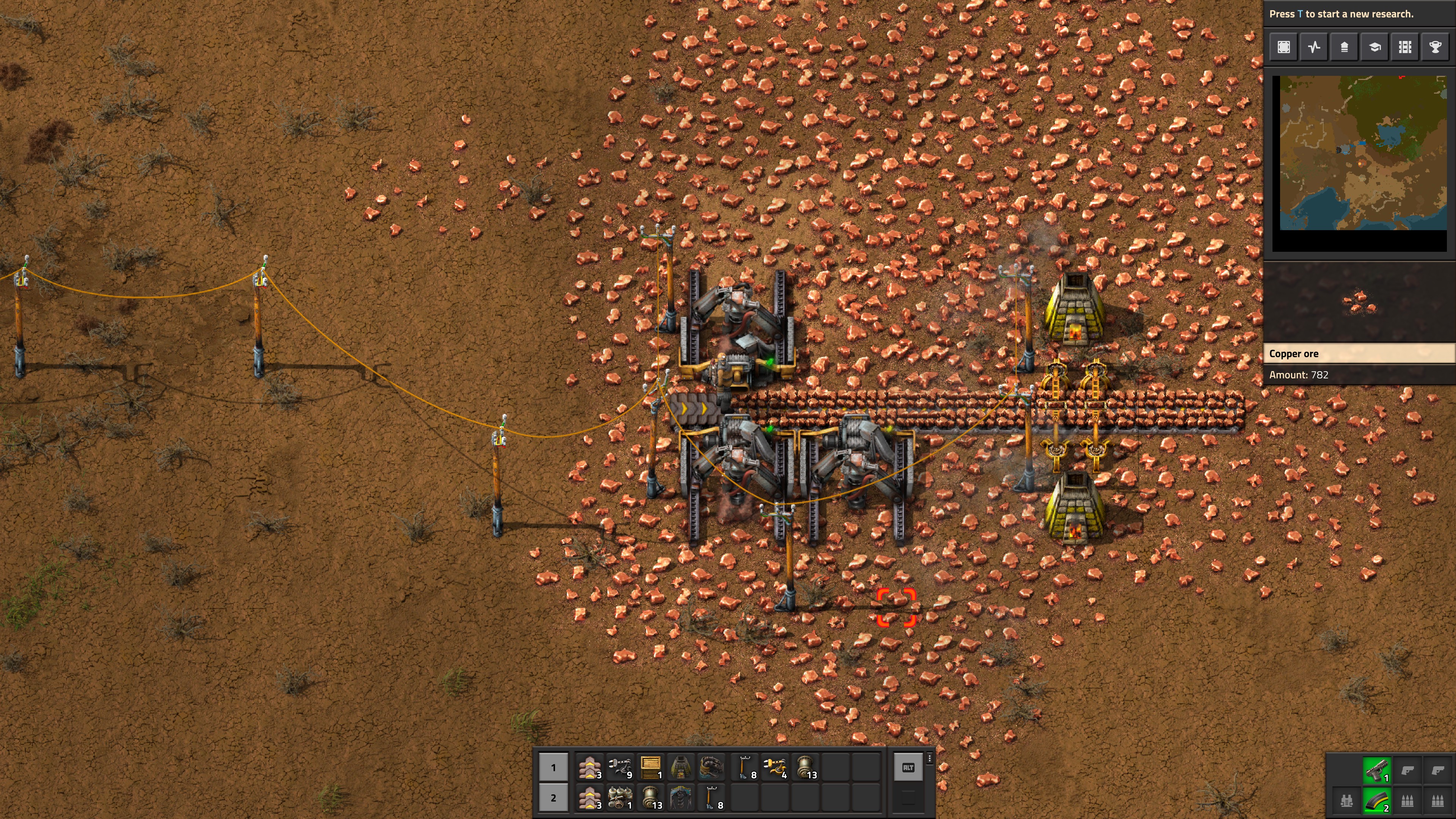
Every object in Factorio's world needs similar treatment, each more complex and involved than the last. The solution to this gargantuan problem is automation, and that is the crux of Factorio's play. Rather than building tools and structures yourself, you instead build processes, establishing production chains and assembly lines so all the hard work is done for you.
Rather than building tools and structures yourself, you instead build processes.
The ways you can do this in Factorio vary, but at their core assembly lines require three key features—transport belts, assemblers, and inserters. Transport belts, as you can probably guess, convey resources and items from A to B. Assemblers assemble items from component parts, and inserters connect the two, shovelling resources into assemblers, or depositing new items from assemblers back onto conveyor belts. (Inserters do far more than this, as it happens, but let's keep things straightforward for now).
Returning to the example of electronic circuits, you can create and assemble copper wire and iron plates in one of several ways. You could create a closed system that assembles those resources specifically for the circuits, complete with bespoke furnaces for smelting copper and iron ore into plates, and a second assembler for the copper wire. Alternatively you could create separate production chains specifically for those components, before transporting them to the assembler that produces circuits.
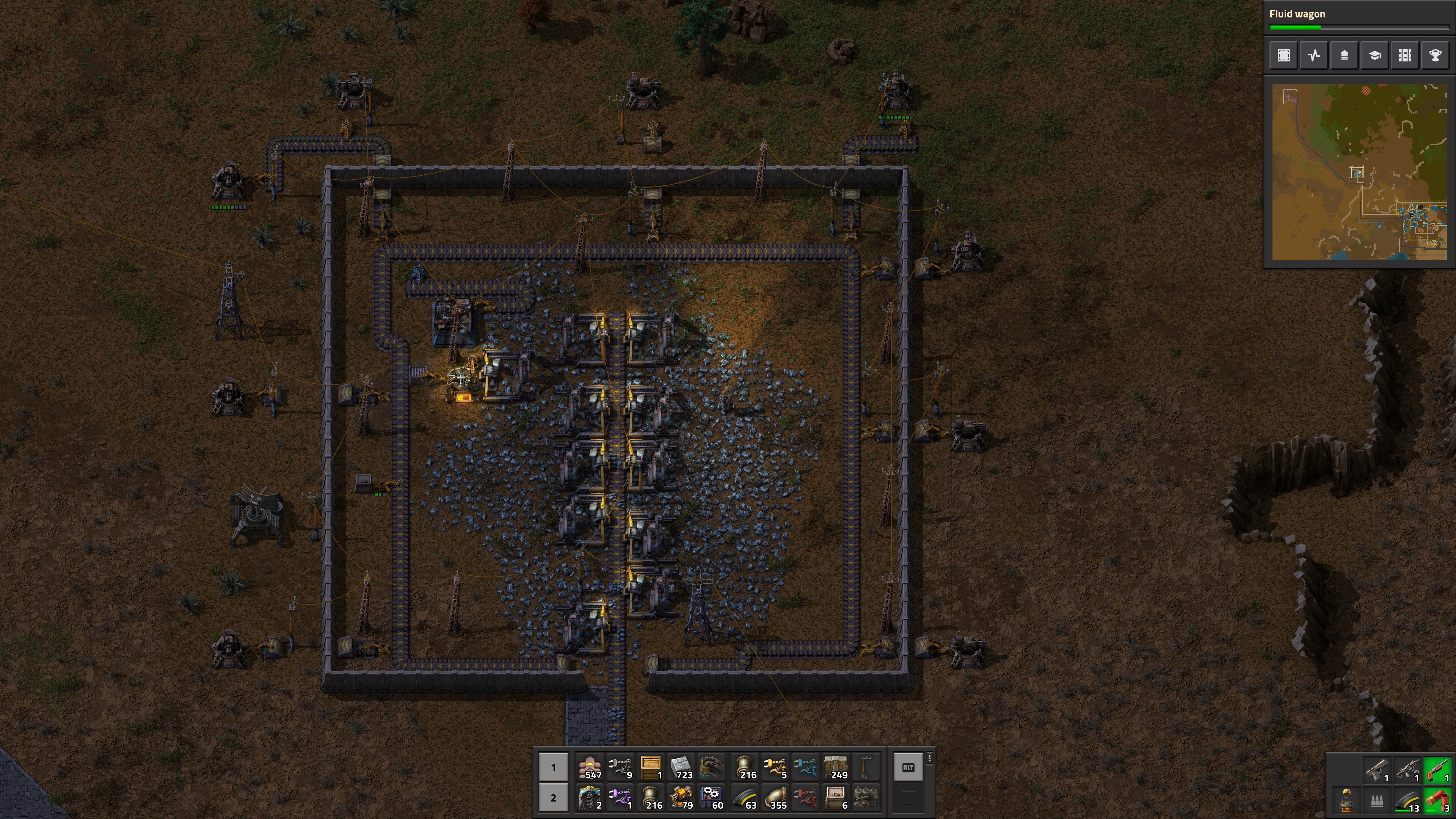
In this way, Factorio's elaborate, open-ended, and utterly engrossing puzzle begins to spin its steel spiderweb through your skull. If you establish a general purpose-conveyor that ferries base resources throughout your factory (known by the community as a "bus"), then you need to figure out how to retrieve the specific items each assembly line needs from that bus, while also ensuring a consistent flow of resources to all those assembly lines. Bear in mind, every single item in the game can and probably should be automated for production, including the items you need to build the assembly lines in the first place. I was into Factorio within five minutes, but the moment it truly 'clicked' for me was when I established an assembly line dedicated to building assemblers.
And this barely scratches the surface of Factorio's chasmal depth. Many mid-tier objects require water as part of their construction, which means building pipelines to your assemblers as well as conveyors. Oil processing is a game in and of itself, as you need to locate deposits on the map, then build refineries to crack the crude oil into its component liquids, all of which are produced in different amounts and must be transported and stored individually. Raw materials are limited and will eventually run out, meaning you need to locate new mineral deposits and expand your factory to take advantage of them, deploying new transportation methods like trains and even drones to acquire them more efficiently.
On and on Factorio goes, with you a mechanical Alice tumbling down the rabbit hole of automation. Eventually your factory will become so elaborate that you'll forget what half your assembly lines are making. If I'm making Factorio sound enormously complex, it is, but it layers that complexity in such a way that you're graded into it, and as such it never feels impenetrable or off-putting, even for someone like me who couldn't hang a picture straight. At some point you'll zoom-out to get a better lay of the land, and think to yourself "Wait, I built that?!".
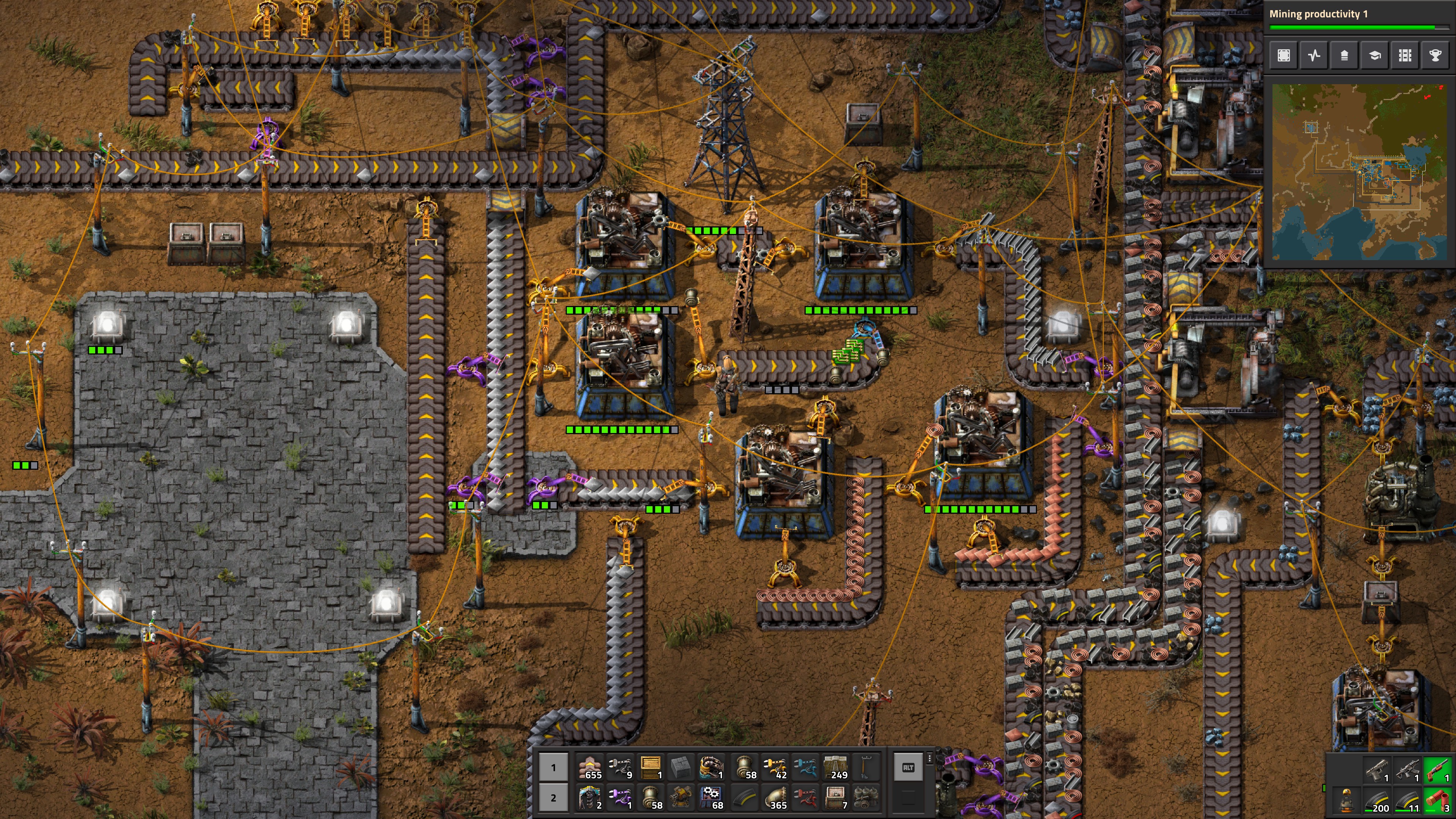
Factorio has been in early access for four years, so most of its creases have been ironed out. There are some minor flaws. Visually it isn't the most exciting game, with an odd penchant for beige and brown. The top-down perspective can also obscure potential spanners in your works, like a missing piece of conveyor belt or an inserter facing the wrong way.
On and on Factorio goes, with you a mechanical Alice tumbling down the rabbit hole of automation.
While not a problem per-se, there is one aspect of Factorio I'm less enthusiastic about—the combat. Factorio has a tower-defence element whereby your factory is attacked by ever-growing swarms of alien bugs. Fighting these critters yourself is fairly tedious, a case of pressing space to fire whatever weapon you're equipped with until they collapse in a puddle of purple goo. Part of me simply doesn't like the idea of combat in Factorio. I don't want to spend ages setting up an elaborate assembly line only for some oversized beetle to come and ruin it.
As time went on, however, I began to understand why Factorio includes combat. Firstly, it adds significantly to the base-building element, with lots of offensive and defensive weapons available for manufacture, ranging from shotguns and automatic turrets to flamethrowers and even atomic bombs. In this way, Factorio requires you to balance logistics and efficiency with protection. After my first bug attack, I created a northern border wall lined with automated turrets, then built a conveyor belt behind the wall designed to automatically feed those turrets ammunition. The combat may not be satisfying, but automating it sure is.
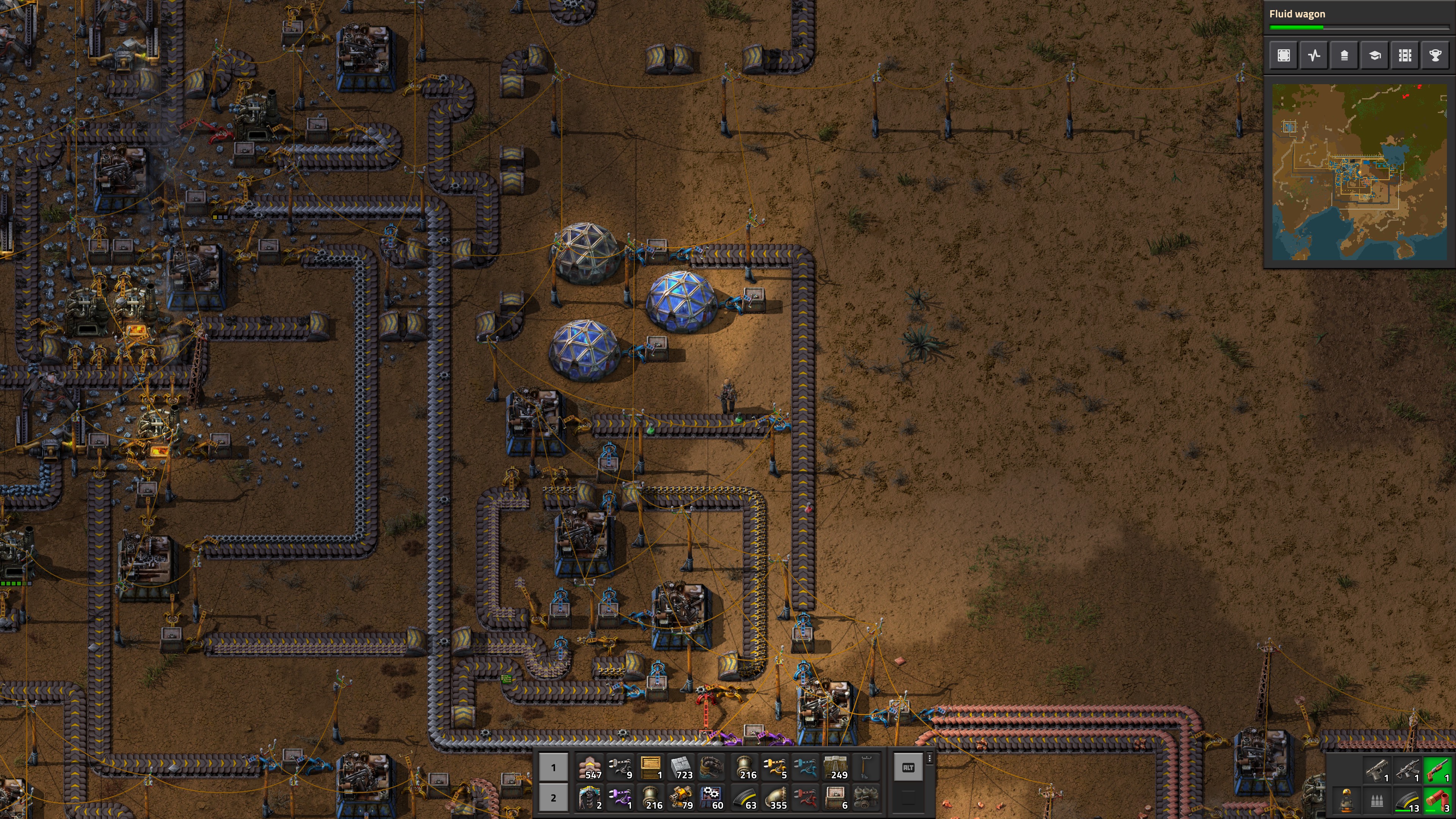
The reason Factorio's combat won me over, however, is not so much the function of it, but why the bugs attack. While your sprawling factory churning out goods and gadgets is all gravy for you, it's less thrilling for the inhabitants of the planet. All that coal burning and oil drilling generates pollution, and your carbonising of the air causes the planet's native creatures to turn hostile. I like that Factorio acknowledges the environmental consequences of your mass manufacturing project, delivering a topical and relevant theme naturally through systems rather than some melodramatic narrative arc. The bug attacks may be a nuisance, but they also serve as a reminder that your actions are as destructive as they are creative.
That's the thematic icing on Factorio's stupendously intricate mechanical cake. I can't remember the last time a game swallowed my brain whole in the way Factorio does. I spent most of my time writing this review fighting the urge to stop and play more. It's even spilled over into my dreams. I see conveyor belts when I close my eyes. It's the best management game I've played for ages, a manufacturing masterpiece.
Buy Factorio. Build Factorio. Become Factorio.
Rick has been fascinated by PC gaming since he was seven years old, when he used to sneak into his dad's home office for covert sessions of Doom. He grew up on a diet of similarly unsuitable games, with favourites including Quake, Thief, Half-Life and Deus Ex. Between 2013 and 2022, Rick was games editor of Custom PC magazine and associated website bit-tech.net. But he's always kept one foot in freelance games journalism, writing for publications like Edge, Eurogamer, the Guardian and, naturally, PC Gamer. While he'll play anything that can be controlled with a keyboard and mouse, he has a particular passion for first-person shooters and immersive sims.
